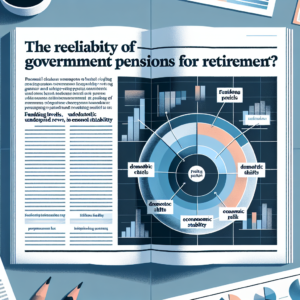Looking at whether you can rely on government pensions for retirement is a question that often weighs heavily on a retiree’s mind. With the average life expectancy increasing and changes in the economy, it’s natural to wonder if the funds provided by the government will be enough to sustain you in your golden years. In this article, we will explore the factors to consider and the options available to ensure a secure and comfortable retirement.

What are government pensions?
Definition of government pensions
Government pensions are retirement benefits provided by the government to eligible individuals. These pensions act as a source of income for retirees and are typically funded through contributions made by both the government and the employees during their working years. The purpose of government pensions is to provide a financial safety net for individuals who have reached a certain age or meet other eligibility criteria.
Types of government pensions for retirement
There are various types of government pensions offered by different countries. Some common types include:
- Social Security: This is a government-funded pension program available in many countries, providing a regular income to individuals who have contributed to the program during their working years.
- Civil Service Pensions: These pensions are provided to employees of the government and may differ based on the specific civil service sector.
- Military Pensions: Military personnel who have served a certain number of years in the armed forces may be eligible for pensions provided by the government.
- Public Sector Pensions: Government employees who work in public sector organizations may be entitled to pensions specific to their employment sector.
Eligibility criteria for government pensions
Eligibility criteria for government pensions vary from country to country and usually depend on factors such as age, years of service, and citizenship status. Common eligibility requirements include reaching a certain age, having contributed a minimum number of years to the pension system, and meeting specific residency or citizenship requirements.
Calculation of government pension amounts
The calculation of government pension amounts can also vary depending on factors such as average earnings, years of service, and specific pension formulas. Typically, pensions are calculated based on a percentage of the individual’s average salary or earnings during their working years. Some systems may also consider the length of time the individual has contributed to the pension program.
Pros of relying on government pensions
Steady and reliable income
One of the main advantages of relying on government pensions is the guarantee of a steady and reliable income during retirement. Government pensions provide retirees with a regular payment, usually on a monthly basis, which helps cover essential expenses such as housing, food, and healthcare. This ensures a certain level of financial stability and peace of mind for retirees.
Social safety net
Government pensions act as a social safety net, providing financial support to individuals who may not have access to other retirement savings or pension plans. These pensions help prevent individuals from falling into poverty during their old age and ensure that basic needs are met.
Inflation protection
Government pensions often come with built-in inflation protection mechanisms, ensuring that the income received keeps up with the rising cost of living. This protection helps retirees maintain their standard of living over time and ensures that their purchasing power does not diminish due to inflation.
Cons of relying on government pensions for retirement
Uncertainty and changing policies
One of the notable disadvantages of relying solely on government pensions is the uncertainty and potential for changing policies. Governments have the authority to modify pension eligibility requirements, benefit amounts, and even the entire pension system. This can create uncertainty for individuals relying solely on government pensions for their retirement income.
Insufficient income
Government pensions may not always provide a sufficient income to cover all expenses during retirement, especially for individuals with higher living costs or those who have not contributed enough during their working years. This can result in financial strain and may require individuals to seek additional sources of income to meet their expenses.
Dependency on government decisions
Relying solely on government pensions may create a certain degree of dependency on the decisions and actions of the government. Changes in economic conditions or political factors can impact the sustainability and availability of government pensions. This dependency may limit an individual’s ability to fully control or plan for their financial future.
Supplementing government pensions
Personal savings and investments
To supplement government pensions, it is advisable to develop a personal savings and investment plan. This can include setting aside a portion of your income and investing in a diversified portfolio of assets such as stocks, bonds, and real estate. These savings and investments can provide additional income during retirement and serve as a safety net in case of unexpected expenses.
Employer-sponsored retirement plans
Participating in an employer-sponsored retirement plan, such as a 401(k) or a pension plan, can also help supplement government pensions. These plans typically allow employees to contribute a portion of their salary, which may be matched by their employer, providing an additional source of retirement income. It’s important to take full advantage of any employer-sponsored retirement plans available to you.
Individual retirement accounts (IRAs)
Individual retirement accounts (IRAs) are another way to supplement government pensions. IRAs offer tax advantages and allow individuals to contribute a certain amount of their earnings each year. These funds can be invested in a variety of financial instruments and provide an additional source of income during retirement.
Annuities and pensions from other sources
Exploring the possibility of annuities or pensions from other sources can also help supplement government pensions. An annuity is a financial product that provides a guaranteed income stream for a specified period or for life. Exploring options such as private pensions or pensions from previous employers can provide additional income and diversify your retirement income sources.

Evaluating your financial needs
Assessing your current lifestyle and expenses
When evaluating your financial needs in retirement, it’s essential to start by assessing your current lifestyle and expenses. Calculate your current monthly expenses and identify any discretionary spending that can be reduced. This will provide a baseline for determining how much income you’ll need during retirement.
Anticipating future expenses
In addition to assessing current expenses, it’s important to anticipate future expenses that may arise during retirement. Consider factors such as healthcare costs, long-term care expenses, and any potential changes in living arrangements. Anticipating these future expenses can help you plan and save accordingly.
Considering healthcare and long-term care costs
Healthcare and long-term care costs are significant considerations when evaluating your financial needs in retirement. Research the costs of medical insurance, prescription medications, and potential long-term care services. Factoring in these expenses will help ensure you have sufficient funds to cover your healthcare needs throughout retirement.
Factoring in personal financial goals and aspirations
Everyone has different financial goals and aspirations for retirement. Whether it’s traveling, pursuing a hobby, or supporting family members, it’s important to factor in these goals when evaluating your financial needs. Consider the costs associated with these goals and allocate resources accordingly.
Longevity risk and retirement planning
Understanding the risk of outliving your retirement savings
longevity risk refers to the risk of outliving your retirement savings. With increasing life expectancy, it’s crucial to plan for a longer retirement period. Failing to account for longevity risk can result in running out of funds in the later years of retirement.
Determining strategies to mitigate longevity risk
To mitigate longevity risk, consider strategies such as purchasing annuities that provide a guaranteed income for life or considering insurance products designed to provide income in the event of a longer life expectancy. These strategies can help ensure a steady income stream throughout retirement.
Considering options like annuities and insurance products
Annuities and insurance products can play a significant role in managing longevity risk. Annuities, specifically longevity annuities, provide regular income payments starting at a later age, addressing the risk of running out of money in advanced old age. Additionally, exploring insurance products such as long-term care insurance can help protect against the potentially high costs of long-term care services.

Alternative retirement income sources
Part-time work or self-employment
An alternative retirement income source can be part-time work or self-employment. Many retirees choose to continue working in some capacity during retirement to supplement their income. Whether it’s consulting, freelancing, or starting a small business, these options can provide additional financial security and a sense of purpose in retirement.
Renting out properties or utilizing assets
Renting out properties or utilizing assets that generate income can be another way to supplement retirement income. If you own rental properties, consider renting them out to generate additional cash flow. Similarly, if you have assets such as unused space, you can explore options like Airbnb or similar platforms to generate rental income.
Reverse mortgages and home equity
For individuals who own their homes, reverse mortgages or utilizing home equity can be a potential source of income during retirement. Reverse mortgages allow homeowners to access the equity built up in their homes, providing a regular income stream or a lump sum payment. It’s important to carefully consider the implications and potential risks associated with reverse mortgages before pursuing this option.
Starting a small business or pursuing a passion
Retirement offers an opportunity to pursue passions or start a small business that can generate income. Whether it’s turning a hobby into a small business or monetizing a skill, exploring entrepreneurial ventures can provide financial independence and fulfillment during retirement.
Impact of government policies on retirement
Changes in pension eligibility and benefits
Government policies can significantly impact retirement planning. Changes in pension eligibility and benefits can affect individuals’ retirement income and planning strategies. It’s important to stay informed about any proposed or enacted policy changes that may impact government pensions for retirement to make necessary adjustments to your retirement plans.
Reforms in retirement age and retirement savings
Government policies often include reforms related to retirement age and retirement savings. Governments may increase the retirement age, requiring individuals to work for a longer period before becoming eligible for government pensions. Governments may also introduce incentives for increased retirement savings, such as tax breaks or matching contributions. Stay informed about these reforms and adjust your retirement planning accordingly.
Tax implications and legislation affecting retirees
Tax implications and legislation can significantly impact retirees’ financial situations. Changes in tax laws, including income tax rates, taxation of retirement account withdrawals, or deductions for healthcare expenses, can affect retirees’ overall financial health. Consulting with a tax professional and staying updated on tax legislation is crucial for effective retirement planning.

Taking control of your financial future
Educating yourself about personal finance and retirement planning
Taking control of your financial future starts with educating yourself about personal finance and retirement planning. Understand the basics of budgeting, saving, and investing. Stay informed about retirement planning strategies and explore different investment options that suit your risk tolerance and financial goals.
Seeking professional financial advice
While self-education is essential, seeking professional financial advice can provide valuable guidance and expertise. Consider consulting with a certified financial planner who can help assess your financial situation, develop a retirement plan, and suggest appropriate investment strategies to achieve your retirement goals.
Creating a comprehensive retirement strategy
To take control of your financial future, create a comprehensive retirement strategy that includes a combination of government pensions, personal savings, investments, and other income sources. Identify your financial goals, establish a realistic timeline, and develop a detailed plan to achieve those goals.
Regularly reviewing and adjusting your retirement plan
Lastly, regularly review and adjust your retirement plan as needed. Life circumstances, market conditions, and regulatory changes may require adjustments to your retirement strategy. Regularly review your investments, income sources, and financial goals to ensure you are on track for a secure retirement.
Conclusion
While government pensions can provide an important source of income during retirement, it is essential to consider them as part of a broader retirement plan. Assessing your financial needs, exploring additional income sources, and staying informed about changes in government policies are crucial for securing a comfortable and financially stable retirement. By taking control of your financial future and creating a comprehensive retirement strategy, you can ensure peace of mind and a fulfilling retirement experience.


